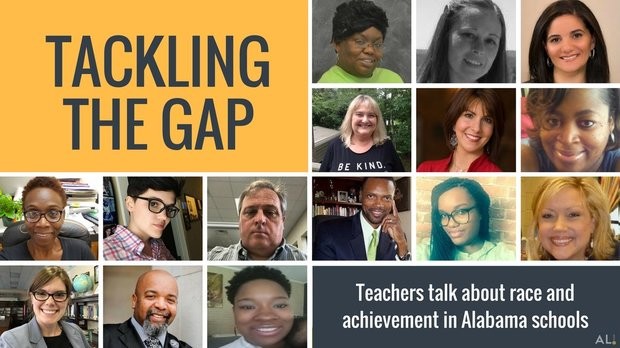AL.com ("Tackling the Gap")

AL.com's "Tackling the Gap" series focused on solutions to improve the achievement gap between black and white students in Alabama's public schools. For the series, Education Reporter Trisha Crain wanted to amplify the voices of teachers, who often don't speak out in public due to fear of professional repercussions. This was especially true for a sensitive topic like race in education. To engineer the conversation, Michelle Holmes, Vice President of Content for the Alabama Media Group (the publisher of AL.com), suggested partnering with Spaceship Media, which had produced "The Alabama/California Conversation" for AL.com a few months earlier, connecting female Trump voters in Alabama with female Clinton supporters in California through a private Facebook group.
TOOLS & TACTICS:
- Partnership with Spaceship Media: Spaceship Media is a non-profit that works with media organizations to design and manage engagement conversations between communities in conflict (or communities that are simply not talking to each other). Its specialty is Dialogue Journalism engagements — “conversation experiences” that start with listening and lead to content that reflects the rich experience of getting to know others as whole people while discussing tough issues.
- Closed Facebook group for teachers: In partnership with AL.com, Spaceship Media built a closed Facebook group bringing together 60 Alabama teachers of different races and from different grade levels to discuss the causes of inequity in educational outcomes, and to strategize on the best ways to respond in their classrooms. While questions were put to the group to answer, teachers were also given the chance to talk openly about what really bothered them, whether it was discipline, cultural differences, poverty, or implicit bias. The conversation explored aspects of the achievement gap including differences in resources, school discipline practices, and access to advanced coursework.
- Teacher columns: Spaceship Media carefully cultivated relationships with teachers in the Facebook group, and invited several to write opinion pieces and guest columns sharing their experiences as part of the series.
LESSONS LEARNED:
- Carefully recruit and screen participants: Knowing that teachers are a very guarded group, Crain paid particular attention to screening participants for the Facebook group. She deliberately did not want to include principals, superintendents, or other administrators who might stifle the conversation. An open call on AL.com asked applicants to give their name and their reason for wanting to be a part of the project. More than 200 educators responded. Crain and the Spaceship Media team went through the responses and selected 120 applicants. This pool then received a second survey, asking each individual to share their thoughts about the achievement gap. Those that responded, about 45-60 teachers, were invited to be part of the group.
- Intensive facilitation and moderation: The closed Facebook group opened in May 2017, and Spaceship Media played the primary role in moderating the group, asking questions, seeding and guiding debates, and building a sense of trust among the participants. In addition to managing group dynamics, the Spaceship Media team made deliberate efforts to engage individually with teachers in the group that had a hard time expressing themselves (i.e. targeted outreach through Facebook Messenger conversations). To Crain, this heavy investment in moderating the group was critical. “Eve and Jeremy [from Spaceship Media] did such an amazing job cultivating relationships and trust among group members. Someone needs to be doing that the whole time. You can't neglect that."
- Impact can be widespread: The impact of the group extended beyond informing AL.com’s reporting; some participants became more active in local government and education policy, while the debates and solutions proposed in the discussion offered insights into the inner workings of modern school segregation for teachers, education experts, and policymakers. Crain received positive feedback on the final piece in the series, with a number of school officials telling her they would be examining the approaches used by the district in the story.